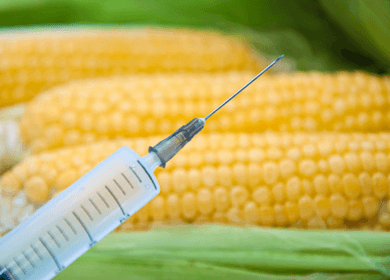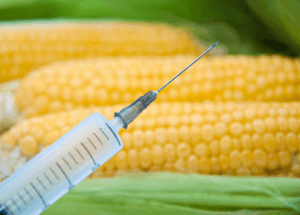
Genetically modified corn is the most common form of conventionally grown corn in the world. However, a recently published study from the University of Verona examined the effects of corn modified with the pesticide Roundup. The findings are both disturbing and upsetting for consumers who are aware of potential health hazards GMO corn poses.
 Increased Cancer Risk
Increased Cancer Risk
In rats fed a steady diet of GMO corn products, female rats experienced higher levels of breast cancer tumors than control rats. In fact, female rats were found to have increased levels of breast cancer that were two to three times that of the control group. In males, kidney and liver tumors were discovered in the rats fed the genetically altered corn.
In addition to gender-specific effects from GMO corn, the rats in the study also experienced changes in their pituitary gland. This is the gland that controls puberty and age-related growth. Scientists explained in their findings that GMO corn interferes with endocrine hormone production and metabolism, resulting in long term changes in gender expression.
 The findings of this study are extremely disturbing. Since Roundup tolerant GMO corn is widely grown by large-scale commercial farms, it is also extensively integrated within the food system. GMO corn is the main source of high fructose syrup that is prevalent in many processed foods. It is also associated with bee colony collapse disorder (CCD) and the increased incidences of food sensitivity in the United States and around the world.
The findings of this study are extremely disturbing. Since Roundup tolerant GMO corn is widely grown by large-scale commercial farms, it is also extensively integrated within the food system. GMO corn is the main source of high fructose syrup that is prevalent in many processed foods. It is also associated with bee colony collapse disorder (CCD) and the increased incidences of food sensitivity in the United States and around the world.
The effects of wide spread low-level pesticide exposure have not been studied extensively in the United States. The Food and Drug Association has approved low levels of pesticide exposure by deeming it “reasonable” and “safe.” Translated, the FDA believes that low level pesticide exposure does not pose a substantial risk for a large portion of the population. The flaw in FDA policy is that the majority of the studies the FDA uses to base their decisions on are sponsored and paid for by pesticide and agrochemical companies.
Eating foods that are grown by small organic farms with diverse crops is the best way to limit exposure to pesticides and food toxins. Instead of eating large amounts of processed foods with that contain GMO ingredients, eat whole foods with organic ingredients. Better yet, start your own garden where you can eliminate the use of pesticides and reduce your carbon footprint.
What are ways you reduce exposure to pesticides and other toxins? We would love to hear your ideas and suggestions!
– The Alternative Daily

